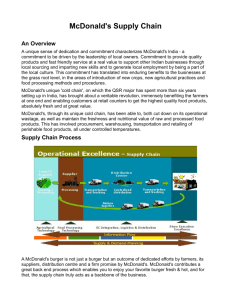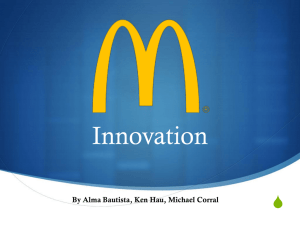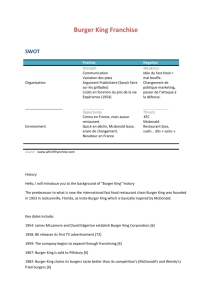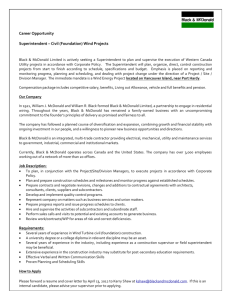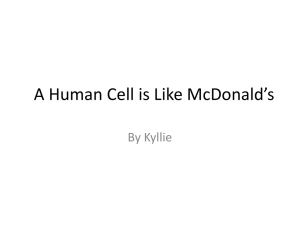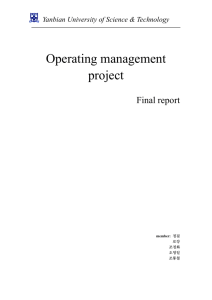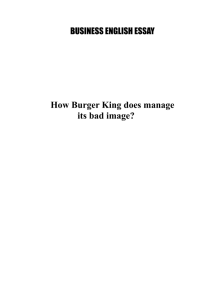Burger Culture
advertisement
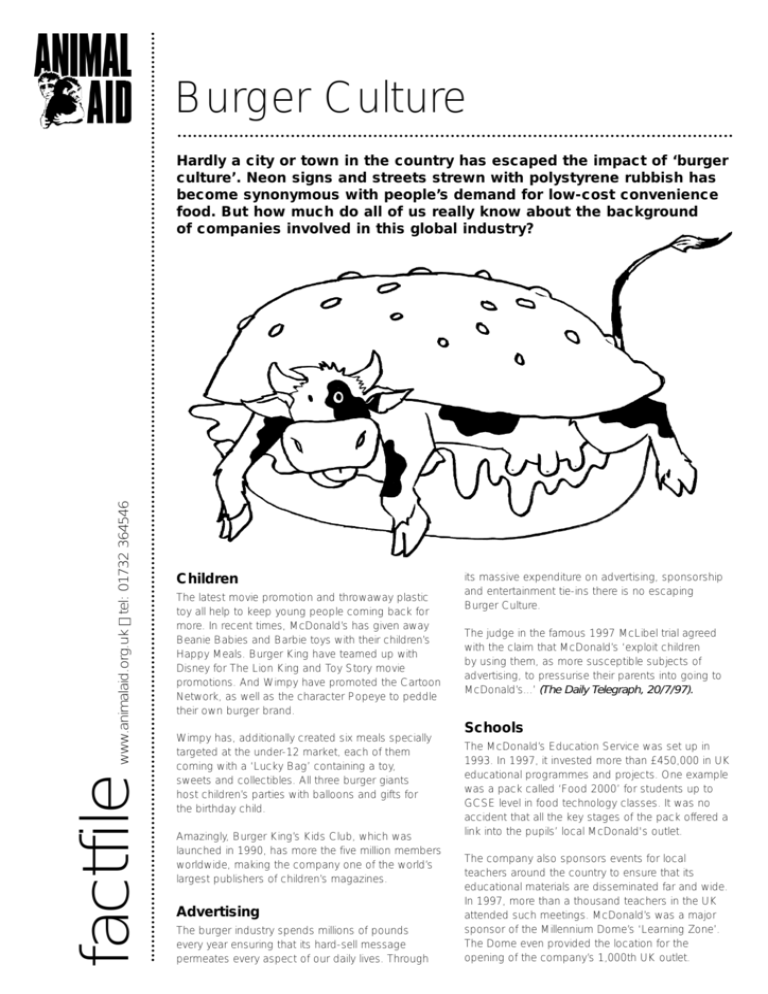
Burger Culture factfile www.animalaid.org.uk • tel: 01732 364546 Hardly a city or town in the country has escaped the impact of ‘burger culture’. Neon signs and streets strewn with polystyrene rubbish has become synonymous with people’s demand for low-cost convenience food. But how much do all of us really know about the background of companies involved in this global industry? Children The latest movie promotion and throwaway plastic toy all help to keep young people coming back for more. In recent times, McDonald’s has given away Beanie Babies and Barbie toys with their children’s Happy Meals. Burger King have teamed up with Disney for The Lion King and Toy Story movie promotions. And Wimpy have promoted the Cartoon Network, as well as the character Popeye to peddle their own burger brand. Wimpy has, additionally created six meals specially targeted at the under-12 market, each of them coming with a ‘Lucky Bag’ containing a toy, sweets and collectibles. All three burger giants host children’s parties with balloons and gifts for the birthday child. Amazingly, Burger King’s Kids Club, which was launched in 1990, has more the five million members worldwide, making the company one of the world’s largest publishers of children’s magazines. Advertising The burger industry spends millions of pounds every year ensuring that its hard-sell message permeates every aspect of our daily lives. Through its massive expenditure on advertising, sponsorship and entertainment tie-ins there is no escaping Burger Culture. The judge in the famous 1997 McLibel trial agreed with the claim that McDonald’s ‘exploit children by using them, as more susceptible subjects of advertising, to pressurise their parents into going to McDonald’s...’ (The Daily Telegraph, 20/7/97). Schools The McDonald’s Education Service was set up in 1993. In 1997, it invested more than £450,000 in UK educational programmes and projects. One example was a pack called ‘Food 2000’ for students up to GCSE level in food technology classes. It was no accident that all the key stages of the pack offered a link into the pupils’ local McDonald's outlet. The company also sponsors events for local teachers around the country to ensure that its educational materials are disseminated far and wide. In 1997, more than a thousand teachers in the UK attended such meetings. McDonald’s was a major sponsor of the Millennium Dome’s ‘Learning Zone’. The Dome even provided the location for the opening of the company’s 1,000th UK outlet. Health And Sporting Links factfile www.animalaid.org.uk • tel: 01732 364546 At the close of the McLibel trial, the presiding judge ruled that ‘McDonald’s food was high in fat, including saturated fat, salt and animal products’ and that various McDonald’s advertisements and publications had ‘pretended a nutritional benefit’ in food which it did not have. (The Daily Telegraph, 20/7/97) To ensure that negative health connotations are far from customers’ minds, the court heard, the company seeks to have its name linked to major sporting events. McDonald’s is the official ‘restaurant’ of the FA Cup and a sponsor of the Premier League. Locally, it sponsors hundreds of youth teams around the country. McDonald’s annual worldwide advertising budget, in excess of $2 billion, has ensured that the Golden Arches symbol is second only in recognition to the five rings of the Olympic Games (of which McDonald’s is an official sponsor). The Christian cross came third. In 1992, a McDonald’s was even opened inside Guy’s Hospital in London. Animals The colourful, sanitised packaging of burgers prevents consumers from making the link between the patty in the bun and animal suffering. In 1997, a judge ruled that McDonald’s was ‘culpably responsible for cruel practices in the rearing and slaughter of some of the animals which are used to produce their food’ (Daily Mail, 20/6/97). Allegations of mistreatment were ‘true in substance and in fact’. But the company tries to gloss over this reality, particularly when targeting young people. David Green, Senior Vice-President of McDonald’s, saidduring the McLibel trial that an advert aimed at teenagers depicted ‘happy burgers growing on plants’ because to show their true origins in the slaughterhouse ‘would not be very appetising’ (McLibel, John Vidal, MacMillan). McDonald’s is the world’s largest single buyer of beef and chicken. The Director of McKey Foods, McDonald’s sole UK supplier of beef and pork, has admitted that ‘as a result of the meat industry, the suffering of animals is inevitable’ (McLibel, John Vidal, MacMillan). Burger King UK uses 27.4 tonnes of beef daily. Geoffrey Guiliano, a Ronald McDonald actor in the 1980s, quit and publicly apologised, stating ‘I brainwashed youngsters into doing wrong. I want to say sorry to children everywhere for selling out to concerns who make millions by murdering animals’ Environment • Of all agricultural land in the UK, more than 90% is used to raise animals for food. • Twenty thousand pounds of potatoes can be grown on one acre of land, but only 165 pounds of beef can be produced in the same space.

